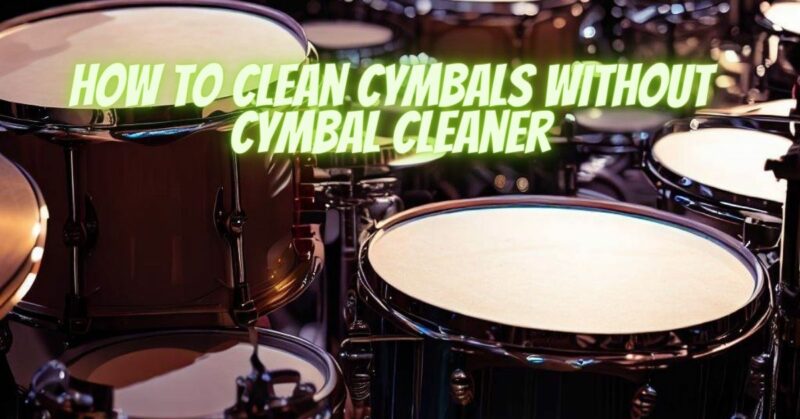If you find yourself without cymbal cleaner on hand, there are still alternative methods to clean your cymbals effectively. In this guide, we will explore some alternative techniques using household items to clean your cymbals without the need for specialized cymbal cleaner. It’s important to note that these methods may not be suitable for all cymbal types and finishes, so always exercise caution and test on a small area first.
Here are some alternative methods to clean cymbals without cymbal cleaner:
- Warm Soapy Water: One of the simplest and safest methods to clean cymbals is using warm soapy water. Follow these steps:
- Fill a basin or sink with warm water.
- Add a small amount of mild dish soap to the water and mix well.
- Submerge the cymbal in the soapy water and let it soak for a few minutes.
- Gently scrub the cymbal with a soft cloth or sponge, focusing on any areas with dirt or tarnish.
- Rinse the cymbal thoroughly with clean water and dry it using a soft cloth. Ensure there is no soap residue left on the cymbal.
- Lemon Juice or Vinegar: Both lemon juice and vinegar can be effective for removing tarnish from cymbals. Follow these steps:
- Squeeze fresh lemon juice into a bowl or soak a cloth in lemon juice. Alternatively, you can use white vinegar instead.
- Rub the lemon juice or vinegar onto the tarnished areas of the cymbal, using a soft cloth or sponge.
- Allow the lemon juice or vinegar to sit on the cymbal for a few minutes to loosen the tarnish.
- Gently scrub the cymbal with the cloth or sponge to remove the tarnish.
- Rinse the cymbal thoroughly with clean water and dry it using a soft cloth.
- Baking Soda Paste: Baking soda is known for its gentle abrasive properties, making it useful for removing tarnish. Follow these steps:
- Create a paste by mixing baking soda with a small amount of water until it forms a thick consistency.
- Apply the baking soda paste to the tarnished areas of the cymbal, using a soft cloth or sponge.
- Gently rub the paste onto the cymbal, focusing on the tarnished spots.
- Rinse the cymbal thoroughly with clean water and dry it using a soft cloth.
- Commercial Brass or Metal Polish (with caution): If you have a brass or metal polish on hand, you can use it to clean your cymbals. However, be cautious, as some polishes may contain ingredients that could damage certain cymbal finishes. Follow these steps:
- Apply a small amount of the brass or metal polish to a soft cloth.
- Gently rub the polish onto the tarnished areas of the cymbal, using circular motions.
- Be mindful of the polish’s instructions and ensure it is suitable for your specific cymbal type and finish.
- Rinse the cymbal thoroughly with clean water and dry it using a soft cloth.
Remember to always exercise caution, test any cleaning method on a small area first, and follow the manufacturer’s recommendations if available. It’s also important to note that frequent or aggressive cleaning can potentially remove or alter the patina on certain cymbals, which may affect their sound characteristics. Regular and gentle cleaning is recommended to maintain the integrity of your cymbals.
Conclusion:
While specialized cymbal cleaners are designed specifically for cleaning cymbals, alternative methods using household items can also be effective. Whether using warm soapy water, lemon juice, vinegar, baking soda paste, or a commercial brass or metal polish, always exercise caution and test on a small area before applying to the entire cymbal. With proper care and maintenance, your cymbals will continue to shine and produce their distinctive sound.


